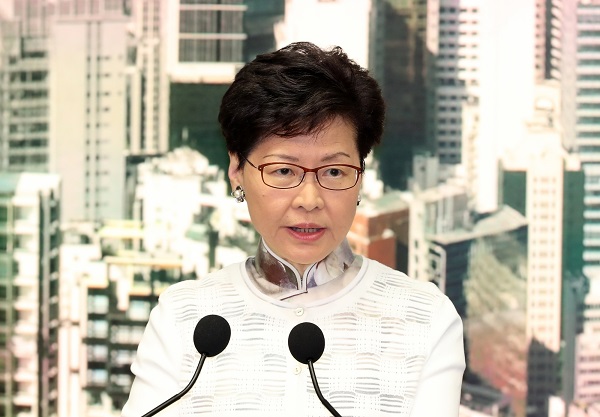Hong Kong, Hong Kong leader Carrie Lam on Tuesday declared that the highly controversial extradition bill that sparked several mass protests was “dead”, changing from an earlier claim that it “will die” in 2020.
However, whether the legislation, which would have allowed the transfer of fugitives to mainland China and other jurisdictions with which the city had no extradition agreement, was effectively withdrawn, as demanded by protesters, remained unclear, reports the South China Morning Post.
“There are still lingering doubts about the government’s sincerity or worries (about) whether the government will restart the process with the Legislative Council,” Lam said.
“So I reiterate here: there is no such plan. The bill is dead.”
She also announced an independent investigative committee to look into police actions during the protests that erupted in the city over the last month, as well as the establishment of a platform for dialogue with those opposing the law, Efe news reported.
“I will publish the result of this report to let everybody know what happened over the last month, and all the people involved in activities last month – police officers or protesters – can submit materials to this independent investigate committee,” she said.
The Chief Executive assumed full responsibility for the crisis but did not give in to the protesters’ recent calls for her resignation. Instead, she asked for an opportunity to bring Hong Kong back to normalcy.
Lam added that it was necessary to reduce the tension, and called for the participation of the entire society to restore calm in the city.
The leader also reached out to the youth, who have played an active role in the recent protests, and announced a platform for better dialogue with students as well as improved management of the universities.
“We need to hear from the younger generations, from different backgrounds, to know what they’re thinking,” she said.
The Chief Executive added that she was “willing to engage in an open dialogue with students without any preconditions”.
Last week, a group of Hong Kong student leaders rejected Lam’s offer of a private meeting about the recent protests over the bill, which would have allowed the transfer of fugitives to mainland China and other jurisdictions with which the city had no extradition agreement, calling it “too little, too late”, according to the South China Morning Post.
The government’s offer came after hundreds of mostly young protesters stormed the city’s legislature on the night of July 1, writing slogans on the wall, defacing Hong Kong’s official emblem and smashing equipment, furniture and work areas.
Protesters have been urging the government to respond to other demands: withdraw the bill completely, retract all references to the protest on June 12 as a riot; set up a commission of inquiry to examine police use of force; and launch democratic reforms.
Lam admitted that the public’s trust in the government was fragile.
Tuesday marks exactly a month since the first mass protest against the bill brought an estimated 1 million people onto the streets on June 9, followed by about 2 million the following weekend.
The controversial bill was first proposed in February. The bill’s opponents have expressed fears that this could lead Hong Kong to lose its judicial independence.
Human rights groups have claimed that the if passed, the new law would allow activists, workers in non-profits and reporters to be deported and persecuted by the Chinese authorities, without offering guarantees to safeguard their rights.










